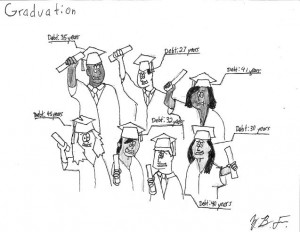
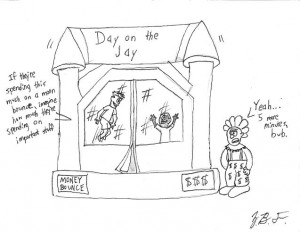

You don’t have to wait for the Rugby World Cup this fall to get your fix of the majestically violent sport. The Ohio Wesleyan Rugby program is hosting tournaments, winning them and taking no mercy.
The inaugural Middleton Hopps Bishop Cup 7s Tournament took place Saturday, April 25. Both the men’s and women’s team participated, and both hoisted the trophy.
OWU hosted teams from Ohio Northern University and Denison University. The tournament style was 7s, which is played with only 7-a-side and for a shorter period of time. As opposed to the typical fifteen per side.
Because of the smaller squads, the OWU men’s team was able to divide into two separate teams.
Captain Carlos Jackson, a sophomore, had high hopes for both teams entering tournament play.
“I expected both OWU teams to be in the finals, we’ve been working hard in practice and it ended up being just like one in the end. I felt bad for the other teams because at the end it was just us playing each other,” Jackson said.
The event went very smoothly overall, despite the 40 degree and rainy weather. Some could say it was perfect rugby weather, others like the captain of the women’s team, sophomore JT Knoble, would disagree.
“Despite the rain and the horrible weather, the tournament was a huge success. All of the teams involved had a good time. It was really awesome for both teams to bring home their own trophy.”
There’s more rugby to come and they used this tournament to help prepare for upcoming events, like the National Finals.
“Our goal was to play together as a team as we prepare for the National Finals at West Academy in NY this weekend.”
The hope is to have The Middleton Hopps Bishop 7s Tournament become a yearly event, increasing in size and participation each year.
Middleton Hopps helped out with setting up the women’s rugby program at Ohio Wesleyan.
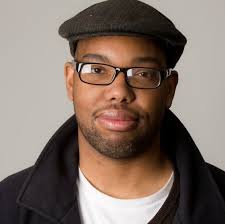
Award-winning writer and current senior editor and blogger for The Atlantic inspired students by discussing his ideas about writing.
As part of the David Osborne Lecture Series, funded by the English department, Ta-Nehisi Coates visited Ohio Wesleyan on April 21.
The series provides opportunities for first-year writing students and others to learn about some of the challenges of being a writer.
Coates is the author of The Beautiful Struggle: A Father, Two Sons, and an Unlikely Road to Manhood, which is a memoir of his childhood as a black American in Baltimore.
During the talk, Coates discussed how black American writers influence his writing. Coates said, “one of the most influential pieces of writing I encountered while growing up was James Baldwin.”
Coates said, “We didn’t get the chance to bear witness to the great American disputes that fought for our rights, and therefore I wanted to have a say in writing my own history and portraying the truth in the purest form.”
Coates explained that his need for writing “started with a need to do something and make a change.” A large majority of Coates writing discusses growing up as a black American and the challenges and lessons that came with it.
“It’s okay to be inspired by other people; it’s good to take literary inspiration from other things,” he explained to students.
The main focus of Coates’ presentation was explaining to students the importance of writing for the correct reasons and finding joy in writing. “I want students to share the romance or pleasure of writing and not focus on the business side of writing because you have to. I think a lot of people lose sight of the romance and pleasure of writing.”
Coates said he has “always had a love for reading and writing. I would cut class and go to the library.”
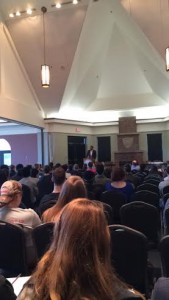
“I often question why things are the way they are for African Americans today, this is what often drives a lot of my writing,” Coates said.
Senior Mariah Bockbrader said “It was inspiring to hear someone who is not only good at writing, but who makes writing his passion and his life. I could tell that he writes more for enjoyment than for his career. It was definitely a message that everyone needs to hear: writing is a beautiful process and shouldn’t be a dreadful prospect. We should be looking at our papers as a way to improve our writing and as a way to garner creativity.”
Coates was a unanimous decision to bring to campus. Assistant professor of English Nancy Comorau said, “the department has a meeting for possible speakers for the David Osborne Lecture Series. Because we had a little extra endowment money than usual, I brought him up in the meeting.”
From there Comorau “hunted down his agency and he luckily had time to come to campus.”
The Osborne Lecture Series is a common event geared towards freshman students in English 105. Comorau said “we hope these events brought to campus can help students think through their writing and the process.”
“Him being here spoke to a lot of different groups of students on campus. What he does and the conversation he has gets to the very spirit of liberal arts. It’s not just a question of appealing to everyone but appealing to different interests, but having them all connect,” Comorau said.
Following his visit to OWU, Coates headed to speak at Johns Hopkins University.
We are two weeks away from graduation. I’d say the real world is knocking on the door, but at this point I feel more like the first little pig in his house of hay, and the world is huffing and puffing. For those of us who don’t yet have a job, the stress of finding one has kicked in, hard – almost as hard as Christian Grey has sex.
What’s the next step for us seniors, you ask? Good question. Some of the members of our class have job offers or are off to grad school (congratulations, you make us proud). I’m going to go out on a limb here and say that most of us are still trying to figure something out.
If I get asked one more time what I’m doing this summer or after graduation, I might punch someone in the face. My hatred for this question is so blatant that during a Spanish class, my teacher asked everyone in it but me, stating that, “She knows how much this question irritates me.”
I have absolutely no idea what I’ll be doing this summer, let alone with my life. I don’t even know which country I will call home in two weeks. And while that and other things such as grades and finding a job are absolutely despairing, I find comfort in the fact I have around 400 other anguished seniors who are still trying to find their footing.
In my desperate attempts to find a job, I sent applications almost around the clock. I’m an addict. I’ve been selling myself for the past four months. Sending resumes, cover letters, doing Skype interviews, phone interviews, regular interviews, you name it. Last week, I came to the conclusion that I was damn tired of selling myself – I was ready to take this body off the streets.
So I took a break from applying. Yet, I realized very quickly that it was a bad idea, and I fell off the wagon. I’m once again a victim of the likes of websites such as Indeed.com, where they feed you hundreds of job prospects, all of which require at least 1-2 years of experience despite being called entry level jobs. However, that’s a whole different can of worms – I’m not tackling that subject right now, as I am pressed for time. I need to apply for some more jobs.
I’d like to reminisce to high school. No, not the fond memories of our athletic peaks (for most of us, this is undeniably true, sorry y’all), but to graduation memories. Remember how hard it was to leave your high school, your friends, people you’ve known for a large part of your life? Yeah well multiply that by googol (that’s a 10 with 100 zeros behind it for non-science/math majors).
While Delaware and Ohio Wesleyan are a home to many of us, they are not our hometowns. I can go back every summer to Rio and see most of my friends. However, it’s a little trickier to find all of my OWU friends – we don’t all have a place in common besides this school, and our time here is over. That’s what makes this so hard.
I have made friends, connections, and memories that I will never forget. Take comfort in your fellow senior classmates’ struggles, share, bond, hang out, laugh, cry, whatever floats your boat. We can only walk this plank for two more weeks before we fall into the sea that is the real world – make ‘em count.
An experimental theatre troupe performed at Ohio Wesleyan to a semi-packed Gray Chapel.
It was Bread and Puppet’s second time performing at OWU in the last four years.
The troupe invited OWU theatre students to perform alongside them, giving them only three hours of training and rehearsal before the performance.
Junior Sarah Shulman was one of the theatre students to perform on Tuesday, April 20.
“I love experimental theatre,” Shulman said. “It’s a very invigorating experience.”
“It’s very visceral,” chimed in junior Hannah Simpson, another theatre student who performed in the piece.
The performance is a form of political activism. In it, director Peter Schumann performs a monologue called “Sermon to the Cockroaches,” which is meant to be quintessence of the political activism portion of the performance.
“The cockroach is the symbol for the underneath the above system. It’s a despised little thingy of an animal region that was not much visited by humans and it’s the survivor of many disasters already and possibly of the future, (the) survivor of new events,” Schumann said.
The event was a house project for seniors Noah Manskar and Rob O’Neill, both of whom live in the Peace & Justice (P&J) House. Manskar is on the journalism board at OWU, and has ties to the Transcript.
When asked what he hopes audience members took away from the performance, O’Neill said, “To always question what people in power tell you.”
Manskar and O’Neill said the visit, which cost $2,725, was paid for with donations from academic departments, organizations, clubs, or other Small Living Units (SLUs). According to O’Neill, the Wesleyan Council on Student Affairs (WCSA) denied funding for Bread and Puppet’s visit.
“I think it’s great that the students were so resourceful in getting funding all on their own for this,” said Ed Kahn, professor of theatre and dance at OWU.
Schumann, a recent émigré from Germany, is the founder of Bread and Puppet. He began in 1960 in New York City and began touring all over Europe, as well as in the U.S., in places like San Francisco and New England, according to the group’s website.
Quoting Ohio Wesleyan alumnus Branch Rickey, sophomore Lee LeBoeuf began her secretary’s report to the Wesleyan Council on Student Affairs (WCSA) by saying, “It is not the honor you take with you but the heritage you leave behind.”
Despite these words on legacy, the final full senate meeting of the semester focused on things to come.
Junior Jerry Lherisson, president of WCSA, did thank the senators and representatives for their dedication to the council and for “the hard work that resulted in change.” And junior Emma Drongowski, vice president of WCSA, echoed Lherisson’s sentiment.
But Drongowski also mentioned that top members of WCSA are looking to fill a vacancy on the executive committee left by Jess Sanford, a sophomore who will be traveling abroad in the fall. They will begin their search within Sanford’s administrative policy committee but will look elsewhere if necessary.
The academic affairs committee informed senators of plans to host another academic forum next semester. This forum would bring administrators, faculty and students together to discuss OWU’s general education requirements.
Sophomore Jess Choate announced that her residential affairs committee was able to purchase sports equipment for Edwards Gym. Soccer balls, footballs, volleyballs and more will be available to rent in the fall.
Finally, the meeting closed after the allocation of the fall budget was unanimously adopted.
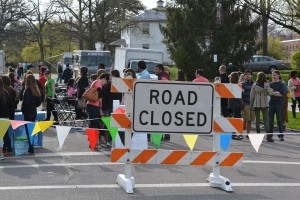
With an higher turnout of around 100 more students, this year’s Rock the Block ramped up the post-Day on the Jay concept begun last spring by bringing in more food trucks and a band from Columbus.
The event was a collaboration of several organizations, including the Campus Programming Board (CPB), Residential Life, the Student Involvement Office and CLEAR (Choosing and Learning Environments with Alcohol Respect).
“We have a new musical group (the Floorwalkers)…this year we’re getting a band from Columbus,” said Residential Life Coordinator Levi Harrel, also an advisor to CPB.
“They were one of the bands we’ve been looking at for a while,” said CPB co-president Elle Benak, a freshman.
The Floorwalkers, who just released their sophomore album, started in Cleveland and were named best band in Columbus by readers of (614) Magazine in 2010, 2011, 2012 and 2014.
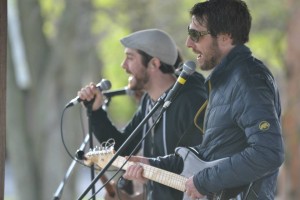
Their Facebook page lists them as a garage soul band, and an OSU Lantern article said they draw influences from “blues, rock ‘n’ roll, funk and soul.”
Last year, music was provided by students ‒ Wahoo Sam Crawford, a band of mostly class of 2014 graduates, and the Arjune DJs.
The Floorwalkers drew less of a direct crowd to Delaware’s nearby Bicentennial Park, but were still listened to by students eating dinner and taking part in other activities on Rowland Avenue.
Whit’s Frozen Custard brought ice cream cups for students, which were provided free and were a big hit.
“I got free Whit’s, and there’s flower pot painting ‒ it’s good,” freshman Emily Burns said.
Senior Luke Peters said he liked the free Whit’s, but didn’t want to spend a lot of money at a food truck, particularly Kinetic, which charges $8 for its signature wraps and bowls.
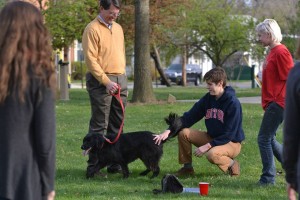
For freshman Sarah Kohn, the food truck options were a relatively new experience; she went with Kinetic for dinner.
“OWU doesn’t have avocados and I’m eating avocados,” she said. “I’m really happy.”
Freshman Abigale Lyon also got Kinetic, though she came to the event to see the flower pot painting run by Modern Foreign Language House and its moderator junior Alanna Spalsbury, a fellow member of Delta Gamma.
The food trucks included PhillyBuster, Holy Smoke BBQ and Kinetic, co-managed by Andrew Tuchow (class of 2013).
Most students got Kinetic, but freshman Bailee Bonanno went with Holy Smoke BBQ and liked her meal a lot.
Eric Smith, a post-graduate intern with the Student Involvement Office, led the food truck selection effort and said variety was the main goal.
“We have a really good variety of food for everyone to enjoy,” Smith said.
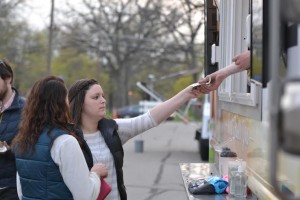
Last year, OWU brought Kinetic and local favorite Dan’s Deli to Rock the Block but Smith decided against Dan’s this time since students can eat there most Wednesday, Friday and Saturday nights.
“We wanted to spice it up (and) see what else we could throw in the mix.”
“I think the event overall went very well,” Harrel said afterward, noting the crowd seemed very energized.
For next year, the organizers plan to expand even further.
“We’re going to have more tables, more games, more events for students to participate in,” Harrel said.
By: Liz Hardaway, Transcript correspondent
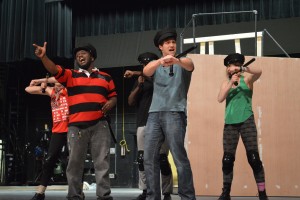
There is nothing dry about “Urinetown: the Musical,” the self-aware and witty comedy that opened at Chappelear Drama Center on April 17.
“Urinetown: the Musical,” written by Greg Kotis, explores corporate control and environmental concerns with a comical, modern-day Romeo and Juliet love story.
Directed by professor of theatre Ed Kahn, the musical took place in a fictional town with a water conservation problem. Urine Good Company, a monopoly, allowed the townspeople to do their business in public restrooms with a price.
However, Bobby Strong, played by freshman TJ Galamba, along with others couldn’t afford to pay as described in the wonderful “Privilege to Pee” sung by senior Brianna J. Robinson.
A corrupt Senator Fipp, played by junior Christian Sanford, and power-hungry CEO Caldwell B. Cladwell, played by senior Ryan Haddad, work together to raise the fee to pee.
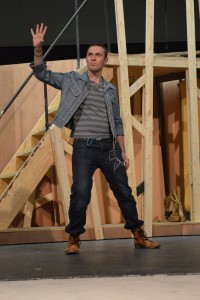
After meeting Hope, Strong’s overly optimistic love interest and daughter of the evil Cladwell, played by senior Grace Thompson, he decided to follow his heart and lead the lower-class citizens to fight for freedom.
Ohio Wesleyan’s theater, music and dance departments did justice to the self-referential musical, with clever commentary from a sassy narrator, Officer Lockstock, played by sophomore Reginald Hemphill, and an innocent rebel, Little Sally, played by junior Sarah Shulman.
The vocals of the performance were exceptional, with soulful melodies from Robinson and a deep bass from Hemphill. Thompson’s voice even mirrored Hope’s merry personality, with luminous ballads evoking the innocence of a Disney Princess; birds were about to fly onto her fingertips.
The audience could not forget they were watching a musical with the overly obvious special effects and a narrator reminding over-eager characters to not reveal any spoilers. As the plot thickened, the sarcasm of the musical always provided comic relief.
“It’s humorous, it’s very self-aware and makes fun of the conventions of musicals while also utilizing them,” said followspot operator, senior Emma Buening.
Organization was a key component within the play, with the cast and crew working since after spring break. Ensembles were choreographed to the last step, and the lights and sound programmed to each second. The collaboration and hard work that went into the designs for the set, costumes, props and every other condition for the performance were undeniably impeccable.
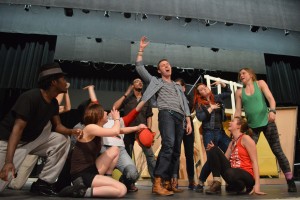
Though entertaining, the musical did tackle social issues such as corporate greed and excess resource consumption. With many green programs being implemented on campus, it is no wonder Kahn chose a tale of a monopolized dystopia plagued with draught and gluttony.
“Urinetown’ provided a witty and informative take on the importance of water conservation,” said freshman Evelynn Wyatt.
Not the typical story, “Urinetown: the Musical” encouraged the audience to find its balance between realism and idealism to handle obstacles.
“Ironically, it is the show’s ‘villain’ who poses the important question, ‘But what of tomorrow?’ Perhaps there are lessons to be learned from both sides, as we strive to follow our hearts,” Kahn said.
Making interdisciplinary connections and improving waste reduction methods are the goals of the team of faculty recently awarded a $50,000 grant.
The grant is one of five awarded nationwide and comes from the Henry Luce Foundation, a nonprofit with a variety of grant programs.
John Krygier, professor of geology and geography, is one of the grant’s campus coordinators and helped write the proposal.
He said the money will be used for exploratory research in Taiwan, South Korea and Japan that will promote collaboration between professors and students involved with environmental studies and East Asian studies, and possibly other disciplines.
“The idea is to look at some ways that faculty and classes in those two different areas interact,” Krygier said. “It comes down to helping faculty get more Asian content in their environmental courses and get more environmental content in Asian courses.”
He said there is money available for students to get involved, and interested students should contact him.
The exploratory grant encourages faculty to collaborate with colleagues who have different, but complementary perspectives on the world, he said.
“Nobody here is an expert on waste, but you get smart faculty and students together and you just pick a topic, like waste, and say ‘How would that be looked at in your field?’” Krygier said.
Taiwan, South Korea and Japan have been innovators in waste reduction, and some of the methods they have developed could be applied in the United States, he said.
The grant money will also be used to examine the waste reduction practices of nearby companies with Asian roots. One such company is Honda, which aims to reduce its waste to zero.
“That is to a reasonable degree inspired by their Japanese headquarters, though it plays out in the United States very differently,” Krygier said. “So, it’s interesting to look at how ideas about waste management have diffused to the United States.”
Much of the research will occur this summer and fall. Next semester, there will be a symposium and workshop in which faculty and students will present their research.
Krygier said if the project goes well, they have the opportunity to be awarded an additional $400,000 to expand on their work.
Junior Reilly Reynolds, moderator of Tree House, said it is great OWU can connect with other countries on sustainability issues because they should be important to everyone.
“The majority of people at OWU are white, privileged, middle to upper class Americans who will never be affected firsthand by climate change by being forced to live in areas where the environment is unsafe,” Reynolds said. “So, in order to find the purpose of caring, we must look outside of ourselves.”
By: DJ Fradkin, Transcript correspondent
Ohio Wesleyan University offers an investment club, allowing students to explore the world of investing and finance by participating in the stock market with no real fear of loss.
The Investment Club is a student managed investment fund comprised currently of 18 equities that are traded on the New York Stock Exchange, said sophomore Graham Littlehale, president of the Investment Club.
The club was founded to expose students who wish to learn more about investing in the stock market. The club provides an opportunity for students to receive investment experience without risking their own money, Littlehale said.
“I have learned enough that I feel as though I could start my own stock portfolio,” Littlehale said. “I would say that anyone who is an active member for a year and has a basic understanding of accounting, should be able to start their own portfolio.”
OWU received a one-time $50,000 grant in 1998 from Jim Oelschlager, founder and chairman of Oaks Associates, designated for students to gain real life experience in trading stocks. The university receives five percent of the portfolio at the end of each calendar year, according to the Ohio Wesleyan Investment Club.
Generally, the club meets or exceeds the investing benchmark. One problem that occurred a few years ago was due to holding a large position in cash. The club did not invest their cash soon enough when market went up, Barbara MacLeod, professor of management, said.
“This year we did very well; we happened to own Kraft when the announcement of a merger came out. That day the stock went up 35 percent,” MacLeod said. “Sometimes you just win, sometimes you lose.”
“The numbers have been increasing and the sophistication of the discussion has really improved,” MacLeod said. “I don’t want the club to lose money, but I let the students make decisions that I might not make in order to further their education, and this has done very well at that goal.”
To encourage students to become more involved in the organization, or just for educational purposes, professor MacLeod also offers a quarter credit course in the fall called Investment Practicum. It provides students with the skills to analyze equities, MacLeod said.
While there are no formal requirements for joining the club, background knowledge is helpful. The organization currently meets Tuesdays from 4:10-5:00 p.m. in the Corns Building. The club president runs almost all of the meetings, but other members are encouraged to assist, Littlehale said.
“Some people, as in life, are more verbal than others, so we are a safe place for people who do not have a background in investing,” MacLeod said. “We meet in the Corns computer lab so we can all be looking up information and answering questions.”
Students generally attend more meetings in the fall, when around 20 members usually participate. However, the spring semester usually sees anywhere between 10 to 15 students. Students also tend to fall off at the end of the semester, MacLeod said.
“Instituted this last year, students have to attend two club meetings before they are allowed to vote, so there are more educated voters to determine whether we should buy or sell a stock,” Macleod said.